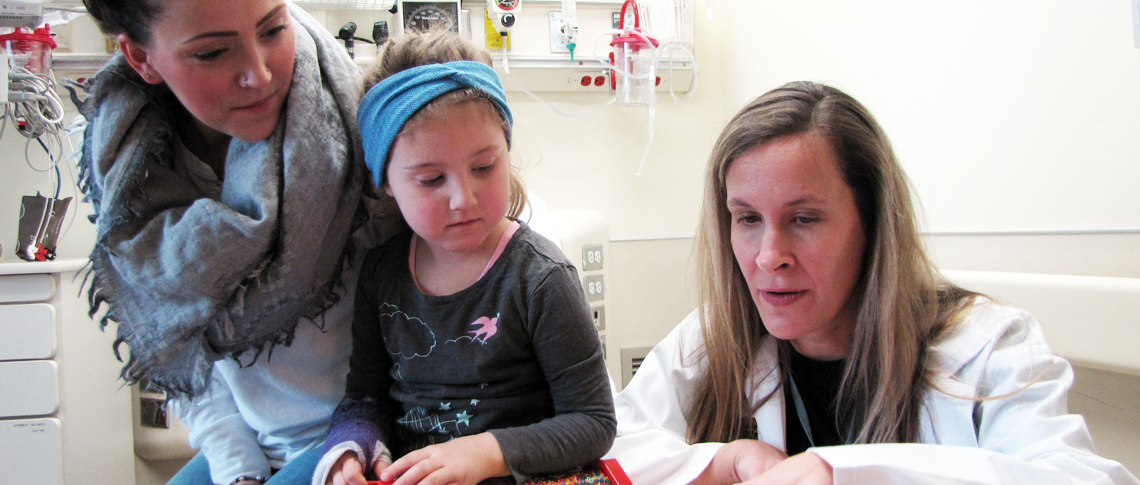
January 7, 2016

Five-year-old patient Micah McKay benefits from a new pain management program at Alberta Children’s Hospital during a recent visit to the Emergency Department.
CALGARY — A new initiative to ease anxiety and pain for children means their emergency department (ED) visits at Alberta Children’s Hospital (ACH) will now be more comfortable.
Launched last fall — and developed by an Alberta Health Services (AHS) team of doctors, nurses and child life specialists — the Commitment to Comfort program aims to add to a child’s comfort and reduce their pain as they receive care in the ED.
“Treating pain is one of our highest priorities. It’s also important to the patients and families we see in the emergency department,” says Dr. Jennifer Thull-Freedman, ACH ED physician.
“This initiative works to educate our families about the options available to them, as well as provide pain-management options to every patient who walks through our doors.”
Work on the project began two years ago when a pair of ED physicians looked into what they could do to better manage pain. In talking to ED patients with painful injuries, they discovered about 15 per cent of children said they would have taken pain medicine in the ED, but none was offered to them, while 18 per cent said they felt their pain was not being managed effectively.
“Some patients told us that when they were offered a pain medicine, they declined it as they thought it might come in a needle,” says Thull-Freedman. “In other instances, parents weren’t sure if they should accept pain medication for their child before the doctor had a chance to check the injury.
“Our Commitment to Comfort is all about working together with patients and families to reduce pain. We want families to know that we want their input, and we want them to know about the options available to them.”
To promote the campaign, comfort menus on the types of pain-management options available are clearly displayed within the ED. They range from needle-free pain medication to an ice pack, a warm blanket, and toys such as a light wand or tablet computer.
Patients are also being given an individual, bookmark-sized pain scale to help them describe their pain, and to help ED staff more accurately understand the level of each patient’s pain.
Nine-year-old William Marshall came to the ACH ED after he broke his arm while snowboarding. He found the new pain scale useful in helping him describe the amount of pain he was in.
“It really helped to look at the face scale and see what my pain was,” he says. “They gave me medicine to help the pain go away and they did a splint. I think they did a really great job.”
In addition, doctors and nurses have received more education on how to support a child in pain. “For example, comfort positions are promoted when a child needs a procedure, so he or she can sit up or snuggle a parent and feel in control, rather than having to lie flat,” says Thull-Freedman.
Early feedback shows the program is proving effective.
“We’ve collected feedback from over 500 patients and their families,” says ED physician Dr. Antonia Stang. Only five per cent are telling us they would have wanted pain medicine but didn’t get it, and families dissatisfied with their pain care has decreased from 15 per cent to five per cent. We’re working towards having 100 per cent of our patients satisfied with how their pain was managed in the ED.”
William’s mother, Barb Marshall, says the new program is an excellent addition to the overall ED experience. “Commitment to Comfort is a wonderful key statement,” she says. “It invites a parent to ask for help for their child’s pain as you realize staff is committed to this initiative.”
According to Thull-Freedman, the program benefits staff as well.
“We’ve made it easier for our staff to do something that’s really important to them,” she says. “We have so many things to prioritize; we may not always notice the child who is experiencing his or her pain quietly. By inviting families to partner with us, we’ve been able to reach more kids.”
Plans are now being made to expand the program into other departments at ACH, as well as to more emergency departments across Calgary by late spring.
Dr. Jennifer Thull-Freedman and Dr. Antonia Stang are members of the Alberta Children’s Hospital Research Institute (ACHRI). Support for the program was provided by an AHS quality improvement grant, the Department of Pediatrics of the University of Calgary and AHS, and community donors through the Alberta Children’s Hospital Foundation.
Alberta Health Services is the provincial health authority responsible for planning and delivering health supports and services for more than four million adults and children living in Alberta. Its mission is to provide a patient-focused, quality health system that is accessible and sustainable for all Albertans.
-30 -
For media inquiries, contact:
Janet Mezzarobba
AHS Communications
587-891-7395
janet.mezzarobba@ahs.ca